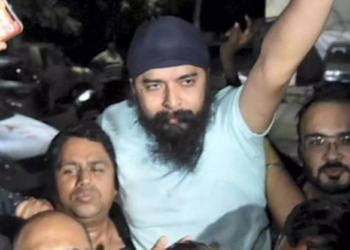
- Though belated, the politically-laced announcement on a pious day broadly welcomed but distrust persist
- Lingering mistrust is mainly because the agitation has, as per one estimate, cost as many as 669 lives
- The situation is back to square one as burning issues like farmer suicides, indebtedness and uncertain marketing for most crops still remain unaddressed.
It is customary for the people of Punjab, especially Sikhs to have a “mini Diwali” on the pious Paraksh Purab (birth anniversary) of Guru Nanak Dev every year. They light “diyas” and take to “aatishbaazi” (fireworks) and flock to gurdwaras to pay obeisance and partake “langar”. But this Friday, the skies over Punjab lit up brighter than ever before and there was unprecedented rush at gurdwaras. And understandably so for it was a double boon for the people of Punjab, especially farmers. That morning, Prime Minister Narendra Modi in his address to the nation announced the repeal of the contentious three farm laws. Five days earlier, the Government had announced the reopening of the Kartarpur Sahib Corridor to the religious shrine in Pakistan, which had been shut down for past 20 months due to COVID.
The announcement on farm laws electrified the otherwise gloomy atmosphere in the Punjab countryside, which had been in a “protest mode” for the past one year. Not just Punjab, the announcement brought cheers in Haryana, Western UP and parts of Rajasthan. At Delhi’s Singhu and Tikri borders, where the protests have been continuing for the past one year, the farmers broke into an impromptu “bhangra” (folk) dance.
The news on farm laws received all-round applause in North India, including from traders, whose businesses had been hit due to the ongoing daily protests over the contentious farm laws. “The cacophony of farm agitation acted as a background noise to everything that went on in North India,” remarked Pooja Sharma, a Chandigarh student studying impact of farm laws on people’s lives.
The three contentious laws promulgated in 2020, which are being repealed are The Farmer’s Produce Trade and Commerce (Promotion and Facilitation) Act, The Farmers (Empowerment and Protection) Agreement of Price Assurance and Farmer Services Act, and the Essential Commodities (Amendment) Act.
While the news of repeal of farm laws was welcomed by all political parties, yet the distrust among the farm unions, which had brilliantly sustained the year-long agitation, persists. “We will wait for the laws to be repealed through the Parliamentary procedure,” announced the Sanyukt Kisan Morcha, which is a joint body of 32 farm unions. The winter session of Parliament is due to start on November 29, where the Government said it would rescind the three laws.
In fact along with the composition of the three laws, what also irked the farmers was the manner in which first the ordinance and then the bills were pushed through the Parliament during the COVID pandemic, when the people were battling for their lives. No wonder the farmers exhibited a rare show of unity cutting across religion, caste and state divisions. Efforts to demonize the farmers from Punjab but labeling them separatists did not succeed. Despite the farm leaders having different ideologies, threat to their occupation forced them into a harmonious working relationship during the agitation.
The lingering mistrust and bitterness is mainly because the agitation has, as per one estimate, cost as many as 669 lives. Farmers, including their women folk withstood heat, rain, thunderstorms and multiple waves of COVID and Dengue. The farmers had managed to keep the agitation alive despite attempts by disruptive elements to hijack the peaceful protest. The agitation was all but derailed on Jan 26 last year when a few misguided elements with a disruptive agenda veered away from the agreed route of the “tractor march” and stormed the historic Red Fort as policemen, who were caught off-guard scampered for cover. The farm union leaders also withstood the machinations of pro-government groups who tried various ways and means to fail the agitation.
The year-long agitation by farmers on Delhi’s outskirts was historic as it drew world-wide attention with support pouring in from all and sundry. Dr. Pramod Kumar, Director of the Chandigarh-based Institute for Development and Communication summed it up, “The agitation became a peoples’ movement which showed that issues can be resolved only through a wider political consultative process and not brute parliamentary majority or warped legal processes.”
Clearly, the decision to repeal the three farm laws has understandably brought about an immediate sigh of relief among political parties in Punjab and UP. Despite assembly elections in these states barely eight-ten weeks away, they have been unable to start campaigning in right earnest. Feeling let down by all political parties over their demands which had been lingering for decades, farmers have not been allowing political leaders to either hold rallies or campaign in the villages in poll-bound Punjab. Even government ministers and officials have been facing protests at official functions.
Besides Punjab, polls are also due in four other states of Goa, Manipur, UP and Uttarakhand in early next year. In Western UP, where the BJP was on the back foot, the decision would obviously put BJP back in the reckoning. The otherwise seemingly intransigent PM was humility personified as he was not apologetic to the farmers during his address but made repeated references to the small farmers and village poor (‘gaanv gareeb’). In Punjab, where BJP on its own was never a force to reckon with, was further isolated for the past one year or so. Shiromani Akali Dal had severed its 25-year long alliance with the BJP. Like in parts of Haryana, its leaders had been roughed up and even assaulted in Punjab by angry farmers during the past one year.
Modi’s decision allows BJP to explore new political avenues in Punjab. They have a more than willing ally in former Punjab CM and Congress leader, Captain Amarinder Singh, who is licking his wounds after being unceremoniously removed from office. A day after PM’s announcement to repeal the laws, Amarinder Singh’s full page advertisements were seen splattered in Punjabi language newspapers, “thanking the Prime Minister for the historic decision.” Congress, Akali Dal and AAP would be reworking their strategies in the changed electoral dynamics. Should the farmer leaders collectively decide to form their own political outfit or join one of their fellow members, Gurnam Singh Chaduni, who has already jumped into the poll fray, all other parties would face the brunt. Having tasted success, farm leaders will be feted in village after village in coming days as clamour for them to take the political plunge could grow louder.
So where does this lead to? While this is seen as a clear victory for the farmers, the fact is that the situation on ground is back to where it was in 2020 before the new laws were promulgated. Numerous challenges relating to farm indebtedness, continuing farmer suicides, awry cropping pattern, MSP and marketing of various crops remain. The PM was conscious of this when he announced the formation of a committee to promote zero budgeting-based agriculture, change in cropping pattern as per the changing needs of the country and to make MSP more effective and transparent. “The committee will have representatives of the central government, state governments, farmers, agricultural scientists, and agricultural economists,” he announced. But going by the statements of farm leaders, Rakesh Tikait and Balbir Singh Rajewal after PM’s announcement, a guarantee on MSP would remain a sticking point in the days to come.
The Government would also be under pressure to withdraw all pending criminal cases against farmers including their leaders which were registered during the agitation. To start afresh, the Government may have to announce a monetary compensation package for the farmers who died during the agitation.
The reversion to status quo on the farm situation underlines the role and responsibilities of the state governments. Said a senior official of the Punjab Agriculture department, “In a situation where most farmers are small and marginal, if the “corporatization of farming” is to be negated, state governments need to facilitate the “cooperative model of farming.” Besides, states need to step up purchase of at least some crops other than what the Centre buys as per the MSP.
Well-known agri-economist, Dr. Sardara Singh Johl, who had welcomed the new farm laws but with certain amendments, said that the Government had done well to repeal the laws since they had caused certain misgivings. “Farm sector is in dire need of reforms. Since the farmers have now managed to get the laws repealed, the onus will now be on them to help the government work out a new system to make farming remunerative.”



